Implementing Odoo, the leading open-source ERP platform, is a crucial decision for Malaysian businesses to shape their business’s future performance and scalability. Its powerful integration across various modules, from CRM, e-commerce, to accounting and inventory management, has made Odoo the choice of over 5 million users globally (and counting).
However, it doesn’t end there. The next challenge you need to overcome, after deciding to use Odoo, is choosing the right hosting solution: Odoo.sh, Odoo Online (Odoo Standard Cloud), or Odoo On-Premise. Each option has its own set of features, catering to different business requirements, growth ambitions, and technical expertise.
In this comprehensive guide, we will take you through the complex differences between Odoo.sh, Odoo Online, and Odoo On-Premise, with their specific features. This will make your decision easier and more consistent with the overall goal.
Definition and Key Features: You Should Clearly Understand About Odoo.sh, Odoo Online, and Odoo On-Premise
Odoo.sh
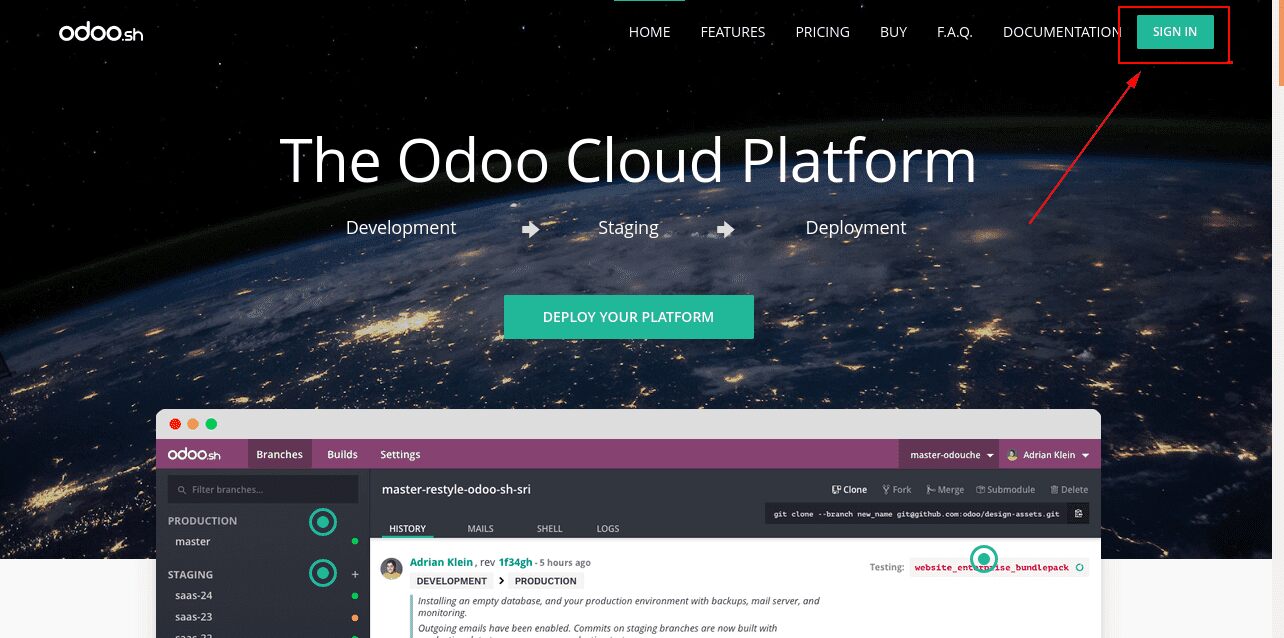
Odoo.sh is a specialized Platform-as-a-Service (PaaS) managed by Odoo SA, providing a sophisticated yet user-friendly solution for deploying and managing Odoo ERP systems. It acts as a bridge between Odoo Online and highly customizable Odoo On-Premise solutions.
Odoo.sh highlights that you should know:
- Pre-Configured Cloud Environment: Odoo.sh provides a ready-to-use cloud server, where you can deploy your Odoo system quickly. This environment is pre-configured so you can easily handle your Odoo applications and customize them as needed.
- Customizable and Flexible: Unlike Odoo online, Odoo.sh allows for extensive customization. You can install additional modules, both from Odoo's own marketplace and third-party sources, customizing the ERP system to meet your specific business needs.
- Integrated Development Tools: Odoo.sh integrates with development tools like GitHub, making version control and collaborative development easier. It includes features like online editors, continuous integration, and staging environments, making development and testing more efficient.
- Scalable Architecture: This way of hosting allows you to configure various aspects of the deployment, such as the number of employees and storage capacity. This scalability ensures that your infrastructure can grow with your business.
- Automated Testing: Odoo.sh includes automated testing for new code commits, ensuring that updates do not negatively impact system performance. This feature helps maintain high-quality and stable software.
Odoo Online
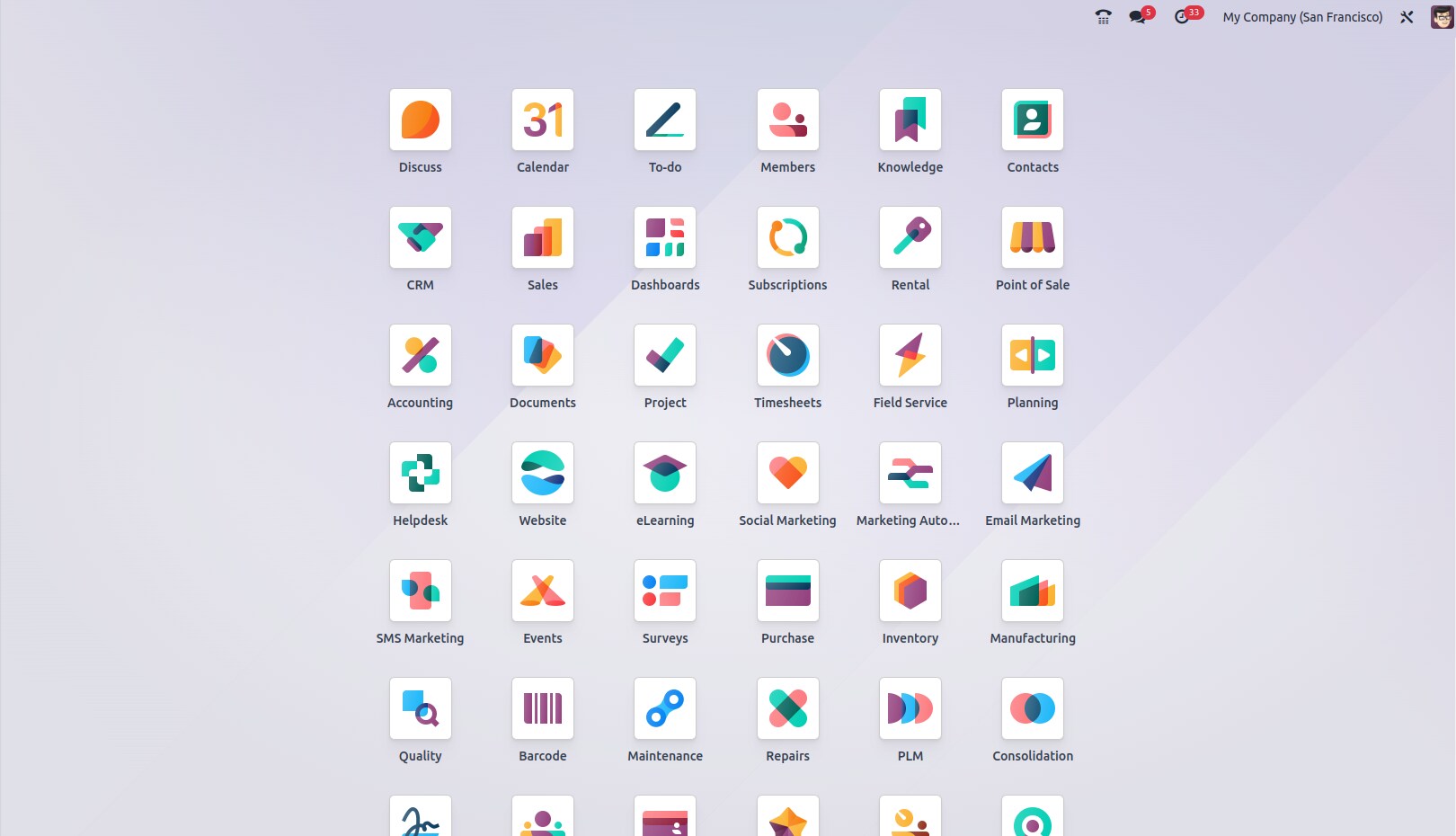
Odoo online is a Software-as-a-Service (SaaS) solution that provides a simple and hassle-free way to access Odoo ERP systems through a fully managed cloud environment. This hosting way is ideal for businesses that prefer simplicity and ease of use, without the expense and resources to worry about technical details. It provides pre-configured databases and eliminates the need for on-server management.
Some key features of Odoo online:
- Seamless Cloud Deployment: Odoo online provides a fully managed cloud environment, ready to use with just a few clicks. Users can access their ERP systems from anywhere without dealing with technical setup or server management.
- Simplified Management: Odoo online handles all technical aspects, including system maintenance, updates, and security patches. This ensures that the platform is always stable and secure, freeing users from IT concerns.
- Robust Service Level Agreement: Odoo online guarantees 99.9% uptime, with daily backups stored on multiple continents. Users can access backups from the previous 3 months and create temporary test environments if needed.
- Core Application Access: Odoo online supports the installation of certified core applications developed by Odoo SA. You can customize these applications, but you are not allowed to install 3rd party modules or change the source code.
Odoo On-Premise

Odoo On-Premise is a self-hosted ERP solution that requires businesses to install and manage the Odoo software on their own servers. This option offers maximum control over customization, security, and data management, but requires a high level of technical expertise to set up, maintain, and update.
Some key features of Odoo On-Premise:
- Full Control and Customization: Odoo On-Premise allows complete control over your ERP environment, offering extensive customization. You can install any application - certified, third-party, or custom-built - tailoring the system to your specific needs.
- Comprehensive Security and Data Management: Businesses have the ability to handle their own infrastructure and data security with Odoo, ensuring tight control over data protection and compliance processes. This setup provides a high level of security that aligns with the company's internal policies.
- High Technical Expertise Required: Setting up and managing Odoo On-Premise requires significant technical skills. You need to handle installation, maintenance, and updates, which can be managed by an in-house-team or through an Odoo Partner.
- No Odoo-Specific Service Level Agreements: Odoo On-Premise does not include service level agreements for uptime or support. Businesses choosing this hosting option are responsible for the performance and scalability of their own systems, with no guarantees from Odoo.
Overall Comparison of Odoo.sh, Odoo Online, and Odoo On-Premise
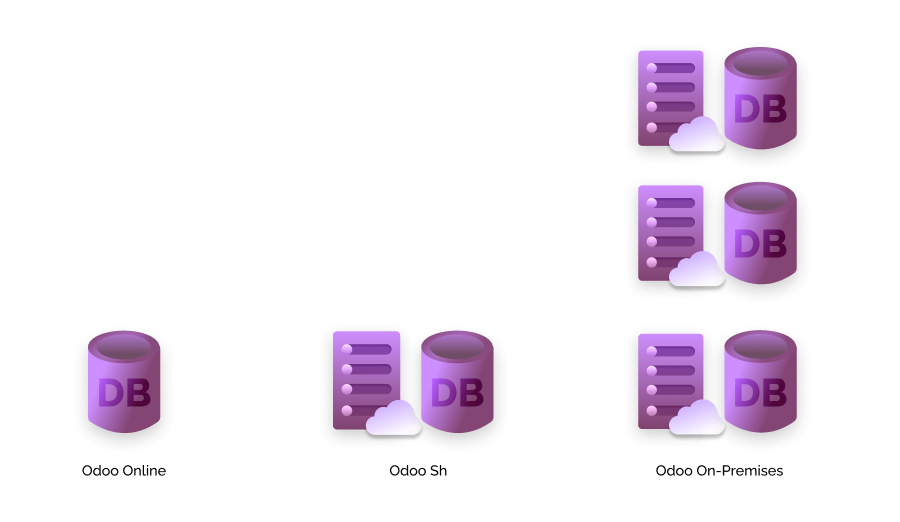
Overall comparison with differences of Odoo.sh, Odoo Online, and Odoo On-Premise:
Criteria | Odoo.sh | Odoo Online | Odoo On-Premise |
Pricing | Flexible, add-ons | Subscription based | Upfront & maintenance |
Customization Options | High, requires expertise | Limited, user-friendly | Extensive, full control |
Apps Integration & Usage | Moderate, 3rd-party integration | Minimal, pre-configured | Full. tailored integrations |
Support | Odoo + integrator | Dedicated Odoo support | IT staff + integrator |
Data Privacy & Security | Shared, some concerns | Shared, automated backups | Full ownership, high control |
User Interface | Intuitive, technical setup | Easy, minimal expertise | Customizable, in-depth control |
Dive Deep Into The Details: Keep Track with Differences of Odoo Cloud Solutions
Pricing
Odoo.sh
Odoo.sh pricing is dynamic and depends on a few key factors:
- Number of workers
- Disk space
- Type of hosting (shared or dedicated)
- Number of staging environments
This model allows businesses to scale as needed, with costs fluctuating based on resource needs such as additional staff or storage.
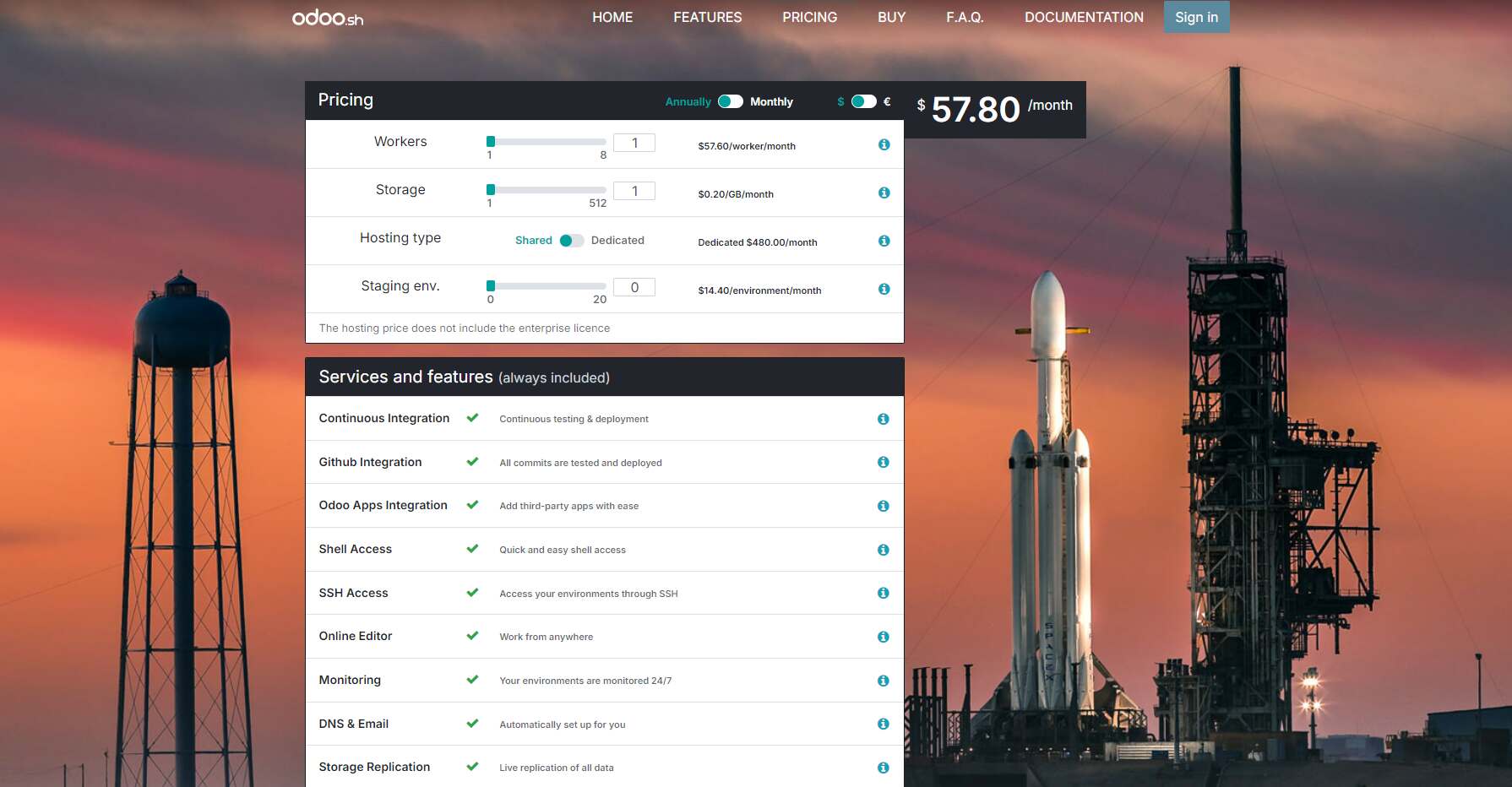
For example, Odoo recommends one extra worker for every 20 back-end users or 4,000 frontend visitors per day. The platform’s general guidelines suggest at least 2GB of storage per user, ensuring your business has the flexibility to scale as demand increases.
The cost will be calculated based on this number (the formula is the same as in the image above). There are no set or fixed prices with Odoo.sh, everything is customized based on your unique needs.
Odoo Online
Odoo online operates on a subscription-based pricing model, starting from $0 for One App Free. The clear cost structure and low starting price are especially valuable for small businesses and startups - where time and finances are of utmost importance.
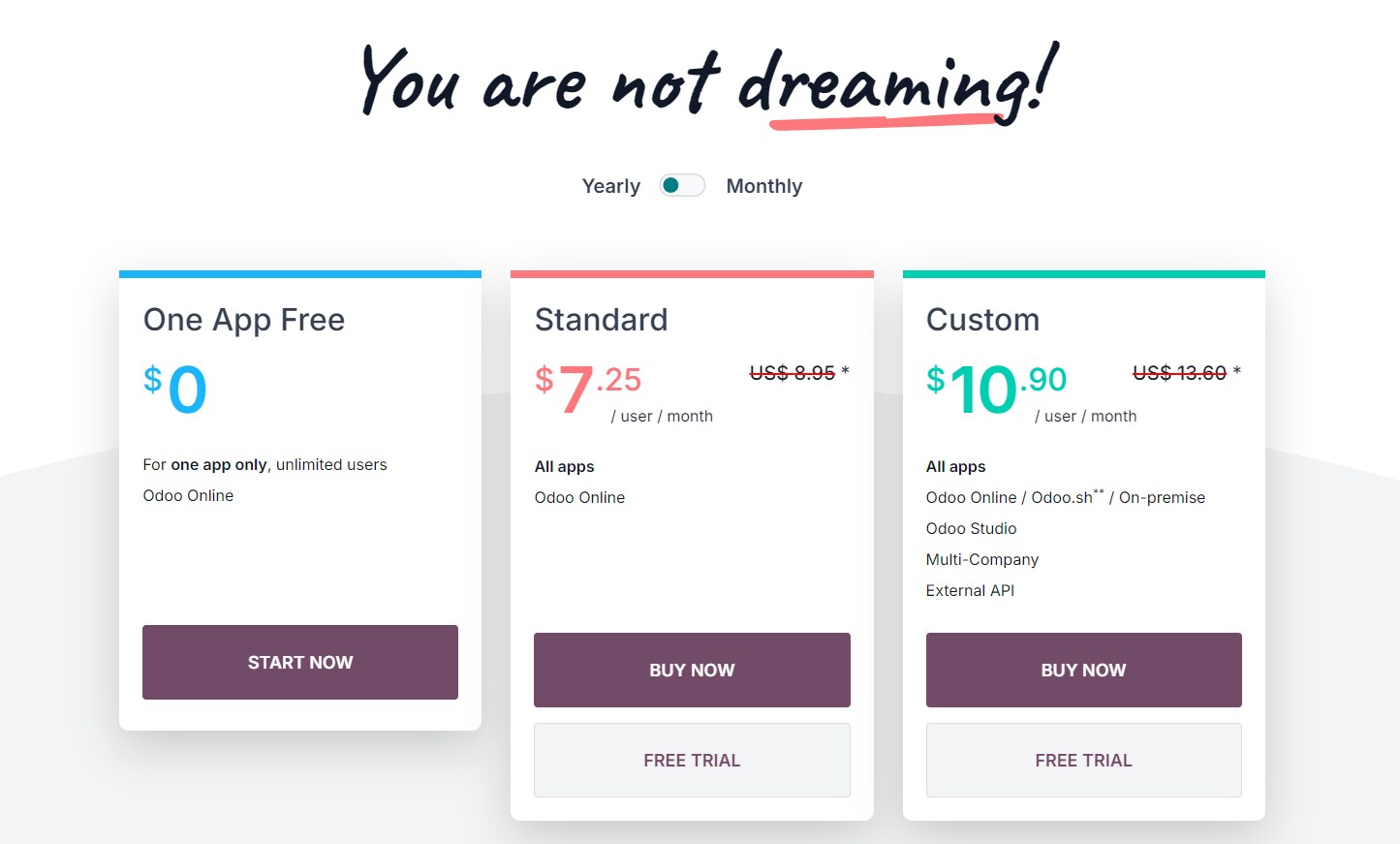
Of course, as you add more users or apps, your subscription costs will increase. Allowing your investment to scale as your business processes expand is Odoo’s way of handling the technical aspects so you can focus on growth. It will also depend heavily on the availability of some functions and apps, rather than the ease of third-party integration with Odoo.sh.
Odoo On-Premise
Odoo On-Premise costs anywhere from $50 to $100 per month, depending on the complexity and scale of your deployment. The total price will reflect the business’s need to manage their own servers and infrastructure, with greater control being offered, requiring more resources and technical expertise.
The cost of an Odoo On-Premise package is usually fixed once both parties have made a final decision. This adds credibility to businesses that want to maintain extensive control over their Odoo environment, and only for them.
Customization Options
Odoo.sh
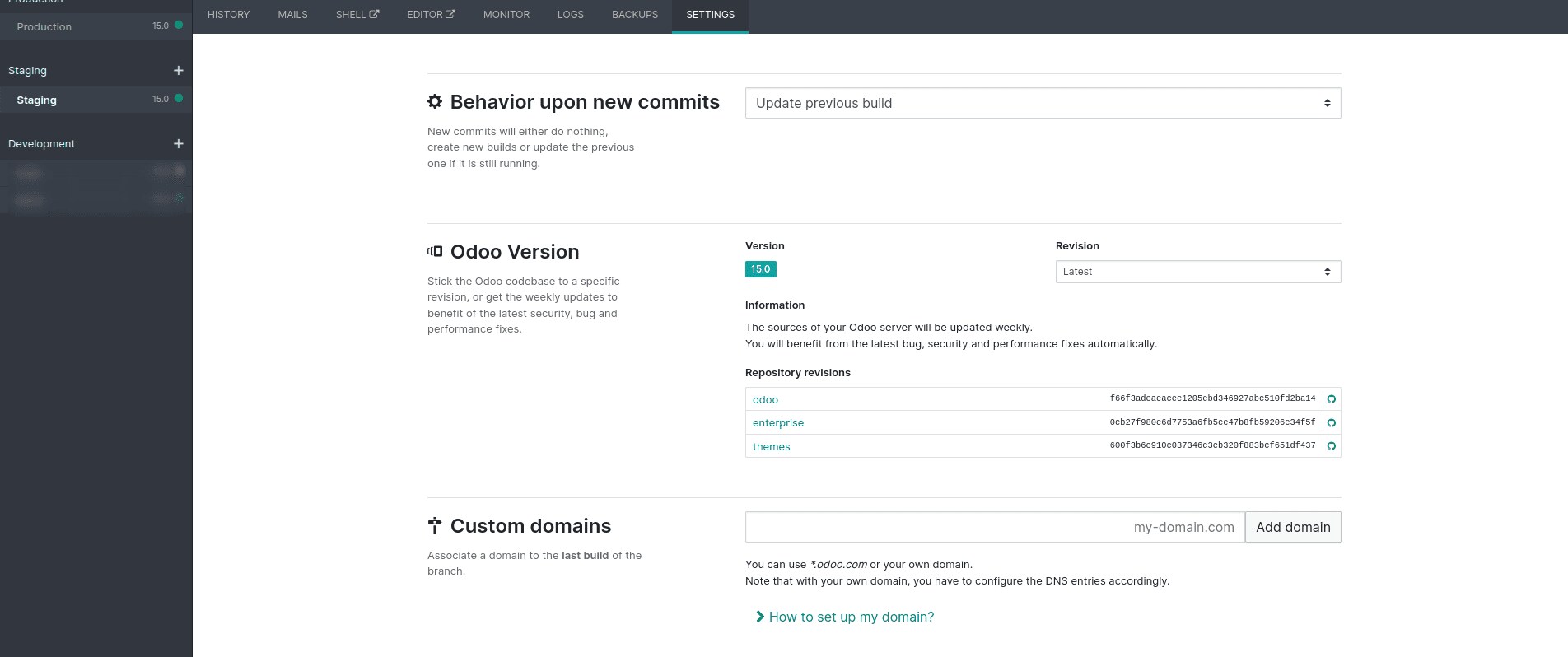
Odoo.sh offers a high level of customization, suitable for businesses that need flexibility without managing the entire infrastructure. With Odoo.sh, you can:
- Install custom modules
- Modify existing applications
- Actively integrate the platform with third-party systems
- Deploy custom code and control staging environments for testing before going live
However, there are still some limitations with Odoo.sh customization. For example, it would be difficult to change the core logic of the software or implement some advanced customizations without the support of developers.
Overall, Odoo.sh would be a typical hosting choice for businesses that need a combination of customization and managed hosting.
Odoo Online
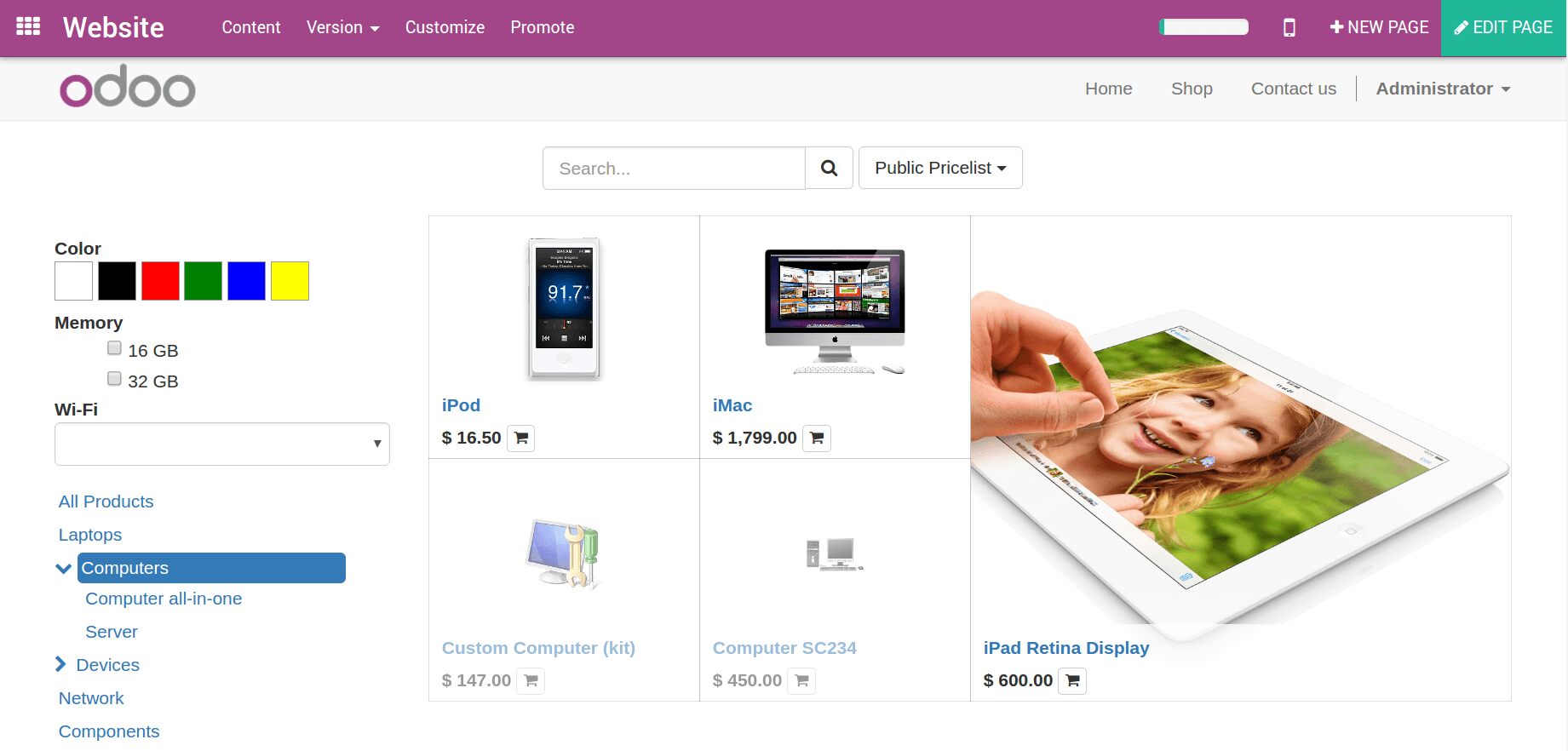
Odoo online does not have the complexity of self-hosting. This option allows you to configure and customize within pre-built modules using tools like Odoo Studio. You can add new fields, customize reports, and create entirely new applications if you want to take your customization to the next level.
However, the ability to add custom modules or make deep changes to the core functionality is highly limited. This is a big drawback if your business is growing rapidly and needs to integrate new tools in quick succession to ensure performance.
Odoo On-Premise
Odoo On-Premise stands out as the most customizable option, giving businesses complete control over every aspect of the module. With this hosting option, you can host Odoo on your own server, giving you the freedom to modify the core logic, develop custom modules from scratch, and integrate with any external system.
Whether you need to change basic features or build entirely new functionality to serve your growing business, Odoo On-Premise offers unparalleled flexibility. However, this level of customization requires significant technical expertise and resources, as your business will need to manage installation, maintenance, updates, and security enhancements on its own.
So for businesses with complex workflows or unique requirements that standard modules cannot meet, Odoo On-Premise is the optimal choice.
Apps Integration and Usage
Odoo.sh
Odoo.sh excels in providing robust integration capabilities for businesses that need to connect their Odoo environment to a variety of external tools and platforms.
- Includes an online editor and continuous integration features, such as your own “runbot” for automated testing and deployment.
- Provides environments for development, staging, and production, combined with branch management for tracking and merging code changes.
- Supports seamless integration with GitHub for version control and custom development, allowing you to proactively manage and track changes through your code repository.
However, Odoo.sh does not yet allow internal integration with external BI tools, requiring a dedicated server to do so. This adds to costs and poses security challenges as you have limited control over server access and configuration.
Odoo Online
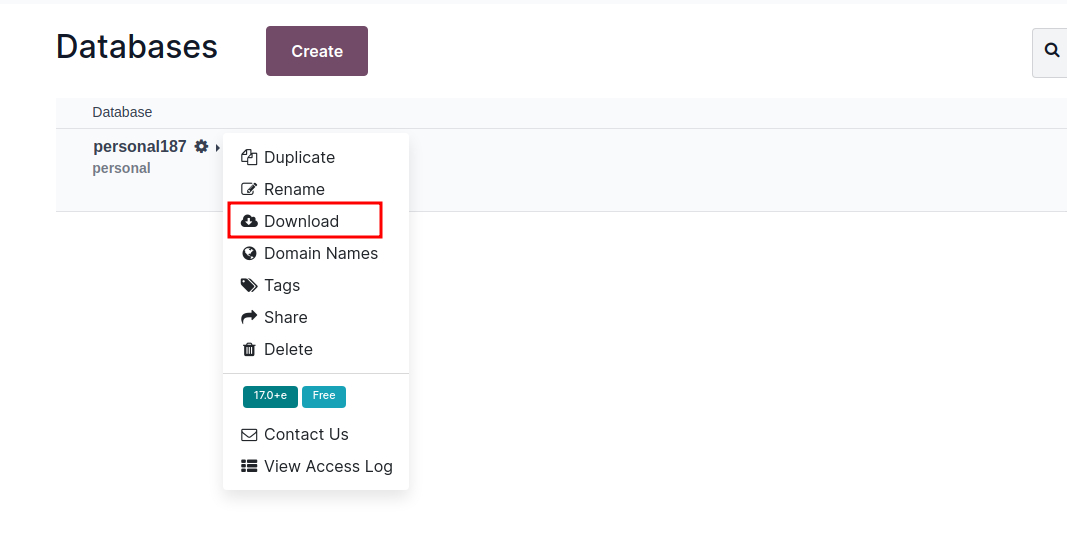
Odoo online focuses on integrating with essential connections in the Odoo ecosystem. You can use pre-built integrations to link various Odoo applications and customize their settings through Odoo Studio.
However, this hosting approach has significant limitations when connecting to external systems and applications.
- No support for third-party e-commerce platforms
- No proactive integration with BI tools like Power BI or Tableau (since Odoo online does not provide direct database access).
Odoo On-Premise
Odoo On-Premise offers the most comprehensive integration with external applications like ERP, CRM, or advanced BI tools like Tableau for in-depth data analysis and reporting. With complete control over the hosting environment, businesses can set up custom integrations with e-commerce platforms, accounting software, and advanced BI tools without restrictions.
You can also deploy unlimited security measures and manage connections according to your specific needs. However, keep in mind that this level of flexibility requires the right solutions and the technical expertise to manage and maintain your on-premises infrastructure.
Support
Odoo.sh
With Odoo.sh, you benefit from the vast knowledge base of the Odoo community, which provides a wealth of information and troubleshooting tips from real-life situations. A real case study: you can refer to Odoo's community forums and documentation if you encounter a sudden problem with Odoo.sh, thereby finding a quick solution without spending too much time.
Due to the technical nature of Odoo.sh, a more advanced user or a dedicated Odoo integrator will be needed to fully utilize the community resources and easily resolve complex issues.
Odoo Online
Odoo online includes dedicated support from the Odoo team, which is especially beneficial for businesses that need live support. It often focuses on guiding users to self-solve with detailed documentation and support tickets, improving the ability to work and handle problems proactively.
While this option offers direct assistance from Odoo experts, it may not be as in-depth as personalized services or advanced technical customizations. So, consider this hosting option carefully if you expect more detailed support.
Odoo On-Premise
Odoo On-Premise typically allows for a combination of businesses and their in-house IT team, a hosting provider, and an Odoo integrator for ongoing support and maintenance. This is especially important when the technical requirements of this hosting option are truly specialized and qualified - not all businesses have the expertise and knowledge in this area.
It ensures comprehensive and tailored support, but of course, still requires a strong internal or external IT structure to manage the complexities involved.
Data Privacy and Security
Odoo.sh
Data hosted on Odoo.sh is stored on a third-party server, which raises some potential privacy concerns, especially for businesses that need to manage high-level confidential information.
While Odoo.sh includes daily backups that are automatically stored for up to 7 days, which can be easily restored to a staging environment for testing, the underlying security protocols are still managed by Odoo and cannot be easily customized. Therefore, you will need to take additional security measures or considerations.
Odoo Online
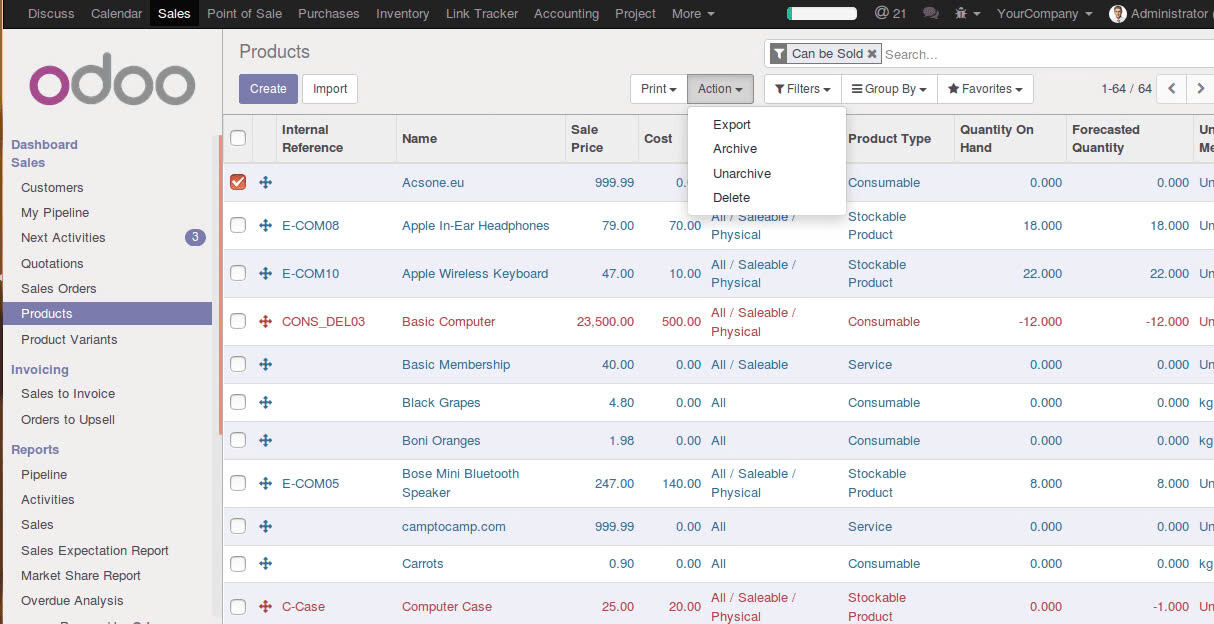
In an Odoo online setup, data privacy and security are primarily handled by Odoo, with backups performed daily and retained for up to 7 days. This automatic backup feature provides a safety net for data recovery, ensuring businesses can roll back their systems to a previous state if needed.
However, similar to Odoo.sh, relying on third-party servers with Odoo online also means that businesses must carefully consider potential privacy risks associated with sensitive data. After all, your business information is no longer yours alone.
Odoo On-Premise
Odoo On-Premise is a hosted version where the software is hosted on your own company servers. Your business has full control over the data, including implementing security measures and customizing protocols. This level of control also means that organizations can tailor their security infrastructure to meet stringent privacy requirements and compliance standards.
Key notes: with this proactive control comes the responsibility to properly manage and secure the system. Failure to do so could expose you to potential vulnerabilities and data breaches, which could have serious legal and financial consequences.
User Interface
Odoo.sh
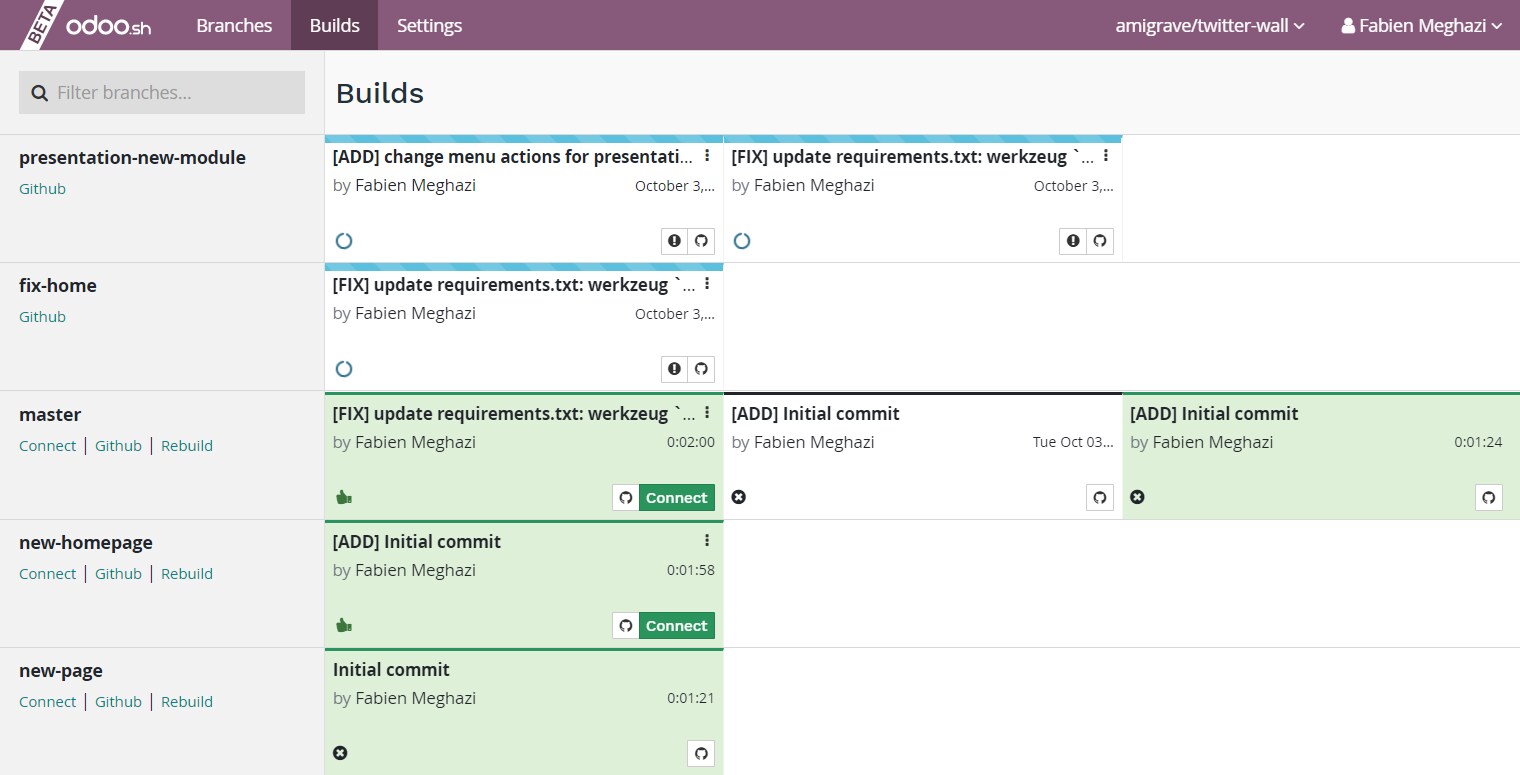
Odoo.sh provides a user interface designed for businesses that need more control over customization and integration. The interface of Odoo.sh is quite accessible, providing a business atmosphere that supports productivity while allowing for deep customization.
However, effective management of the platform still requires some technical knowledge and expertise, especially at the beginning, to adjust and optimize the system directly from the dashboard.
Odoo Online

Odoo online aims for ease of use in the user interface, requiring only minimal technical knowledge. It is clear and user-friendly, providing pre-configured modules and easy to navigate. This ensures that you can focus on your business at the beginning instead of dealing with technical management, and even if you have limited technical knowledge, the operation is still efficient.
Odoo On-Premise
The Odoo On-Premise user interface offers a high level of flexibility and control, making it suitable for businesses with specific requirements and the resources to manage them. While the interface is consistent with other Odoo versions in terms of ease of use, the on-premise setup allows for a higher level of customization. Businesses, when using Odoo On-premise, can easily modify the interface to suit their own processes and workflows.
You should also read this article: In-depth Comparison of Odoo Community vs Odoo Enterprise: Which Differences?
The Right Choice For You: Which One?
Which is the right one for you among these three hosting options? Find the answer and our experts advice as below.
Choose Odoo.sh If …
- You need flexibility without complexity: Requires flexibility to customize and integrate Odoo applications, but lacks the deep technical expertise to have full control.
- You’re eyeing a fast start with future expansion: Aiming for a fast start with superior scalability in the future.
- You need to integrate with external services: Need to connect Odoo with other systems such as e-commerce platforms or accounting software as a third party, ensuring speed and efficiency.
Choose Odoo Online If …
- You are a small business seeking simplicity: Small businesses with limited technical resources and looking for an easy-to-implement solution without worrying about the technical backend, Odoo online is the ideal choice.
- You value low-maintenance solutions: Keeping costs low and avoiding the hassle of server maintenance is a top priority, without the need for in-house IT support.
- You want to get started quickly: Running your operations on Odoo without delays and without the hassle of server management, Odoo online is just for you.
Choose Odoo On-Premise If …
- You’re concerned about data privacy and security: You are extremely concerned about storing data on the server and need absolute security for private data.
- You have specific integration needs: You have specific integration needs or have unique operational requirements that Odoo’s off-the-shelf solutions cannot meet.
- You need full control and customization: You need extensive customization and have enough technical expertise to manage a self-hosted environment.
Final Thoughts
Choosing the right Odoo hosting solution is worth considering because it depends a lot on your business's needs, resources, and future plans. There is no common mechanism or denominator, the key is that you need to clearly understand the differences and advantages and disadvantages of Odoo.sh, Odoo online, and Odoo on-premise to make the most reasonable decision.
If you still have many concerns? Do not hesitate to contact us, A1 Consulting, to receive the most suitable advice. With experience in implementing many large and small Odoo projects with diverse types of businesses and diverse Odoo services implementation, we are confident to help you on this solid starting point.
